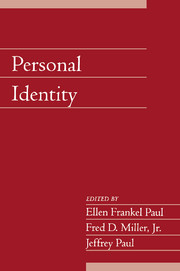Book contents
- Frontmatter
- Contents
- Introduction
- Acknowledgments
- Contributors
- Experience, Agency, and Personal Identity
- When Does a Person Begin?
- Persons, Social Agency, and Constitution
- Hylemorphic Dualism
- Personal Identity and Self-Ownership
- Self-Conception and Personal Identity: Revisiting Parfit and Lewis with an Eye on the Grip of the Unity Reaction
- The Normativity of Self-Grounded Reason
- Rationality Means Being Willing to Say You're Sorry
- Personal Identity and Postmortem Survival
- “The Thing I Am”: Personal Identity in Aquinas and Shakespeare
- Moral Status and Personal Identity: Clones, Embryos, and Future Generations
- The Identity of Identity: Moral and Legal Aspects of Technological Self-Transformation
- Index
Experience, Agency, and Personal Identity
Published online by Cambridge University Press: 05 July 2014
- Frontmatter
- Contents
- Introduction
- Acknowledgments
- Contributors
- Experience, Agency, and Personal Identity
- When Does a Person Begin?
- Persons, Social Agency, and Constitution
- Hylemorphic Dualism
- Personal Identity and Self-Ownership
- Self-Conception and Personal Identity: Revisiting Parfit and Lewis with an Eye on the Grip of the Unity Reaction
- The Normativity of Self-Grounded Reason
- Rationality Means Being Willing to Say You're Sorry
- Personal Identity and Postmortem Survival
- “The Thing I Am”: Personal Identity in Aquinas and Shakespeare
- Moral Status and Personal Identity: Clones, Embryos, and Future Generations
- The Identity of Identity: Moral and Legal Aspects of Technological Self-Transformation
- Index
Summary
I. Introduction
Questions of personal identity are raised in many different philosophical contexts. In metaphysics the question at issue is that of personal identity over time, or of what relation a person at one time must bear to a person at another time in order for them to be, literally, the same person. There are two standard responses to this question in the current literature. One considers a person as essentially a biological entity and defines the identity of the person over time in terms of the continued existence of a single organism. The other follows John Locke in accepting a distinction between persons and human beings and defines the identity of a person in terms of the continued flow of psychological life. This second response—the “psychological continuity theory”—has a great deal of appeal and enjoys a great many supporters. Both positions are still very much alive in the current discussion, suggesting that at the very least each response expresses some important aspect of our thought about what we are and how we continue. In what follows I will leave aside the dispute between these two accounts of identity and will focus only on the psychological side. Understanding what fuels the idea that personal identity should be defined in psychological terms, and what a viable psychological account of identity would look like, is an important goal in its own right and will put us in a better position to understand the relation between psychological and biological accounts of identity.
- Type
- Chapter
- Information
- Personal Identity , pp. 1 - 24Publisher: Cambridge University PressPrint publication year: 2005
- 1
- Cited by

